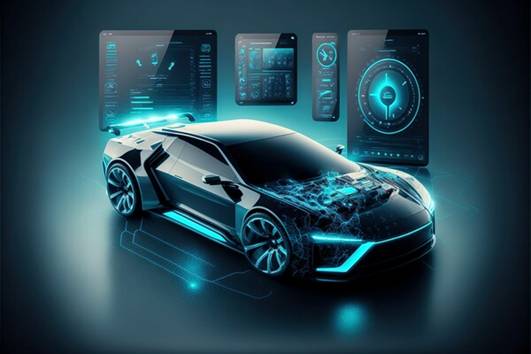DXC briefly describes five major trends in the automotive industry
The transformation to software-defined vehicles will bring changes to the global automotive industry
DXC Technology (New York Stock Exchange stock code: DXC), a leading Fortune 500 global technology service company, predicted five ways to reshape the relationship between human and automobile in the automobile industry in the next five years.

DXC Automotive 5in5
The transition to software-defined vehicles is changing all aspects of the automotive industry, from the way cars are designed to the way they are manufactured, to how we use and maintain them. Crucially, the relationship between auto users and the rich and diverse partners and service ecosystems that make up the auto industry is changing. DXC, which focuses on developing automotive software and platform-driven business models, and its enterprise Luxoft see evidence that the following five trends are accelerating.
1. On-board software will be as important as vehicle logo
The future car will be a software defined vehicle (SDV), whose features and functions are controlled by software.
Matthias Bauhammer, global director of robot drive products at DXC Technology, said: "SDV will be widely known for its user experience rather than its physical characteristics. The software will establish a direct link between automakers and customers, so that platform-driven automobile enterprises can seamlessly provide personalized services to customers through vehicles."
This data exchange is not limited to a single vehicle and its manufacturer. The "crowdfunding data" from millions of cars can provide more intelligent mobile travel services in the entire car ecosystem. For example, the Gaia-X 4 Future Mobility initiative in Europe aims to achieve close interconnection between automotive users, service providers, manufacturers and suppliers. Various applications include intelligent transportation infrastructure, vehicle life cycle management and digital twinning of autonomous vehicles.
2. The user's car will be revitalized and upgraded as needed
As cars are more and more defined and connected by software, their self-repair, self-renewal and self-renewal capabilities will gradually improve.
Karsten Hoffmeister, director of autonomous driving at Luxoft, said: "The software in our mobile phones will be updated regularly, adding various new functions, downloading various applications, updates and security patches to solve many problems and improve the functionality of our devices. To have the same mobility and interactivity as mobile phones, cars still have a way to go, but it is clear that we are witnessing similar evolution."
Most automobile manufacturers in the world are already experimenting with providing on-demand services to users in the form of software. BMW provides downloadable upgrades through My BMW app or car SIM card. Volvo provides customers with "OTA" software updates sent directly to their vehicles.
Some auto companies are considering monetization of software upgrades. In a recent interview with Bloomberg, the CEO of CARIAD, an automotive software company of Volkswagen Group, even said that pay-as-you-go automatic driving is expected to be realized.
3. For Gen Z, owning a car may become the past
The way we live and work is changing. The mixed work mode does not require many employees to drive to work every day. Many young people may want to take advantage of the convenience of cars, but they do not want to adopt the traditional ownership model, which is usually expensive, responsible and rigid. Another way to drive on the road is to pay the vehicle fee only when needed, which may be achieved through car sharing or point-to-point rental services based on subscription. With its on-demand and remote control functions, SDV can provide such services.
Several car manufacturers are experimenting with car subscription models, including Audi, Lexus, Nissan, Porsche and Volvo. Many third parties also provide subscription services, which is a reasonable expansion of existing services for car rental companies. Borrow and other start-ups plan to focus on the subscription of electric vehicles.
GetTransfer.com is an innovative example of the hybrid mobile travel subscription model. It provides customers with a variety of car, helicopter and aircraft rental, rental and transfer services.
4. The car will make an appointment to meet with the mechanic before the user learns about the vehicle problem
John Makin, automotive strategist at Luxoft, said: "As part of the Internet of Things (IoT), the in-car networking function will be used to transmit real-time vehicle diagnostic data, which will be used to plan increasingly complex and easy-to-use predictive maintenance plans."
The feedback related to advanced analysis supported by artificial intelligence (AI) will enable the vehicle to point out imminent problems to the repair shop, dealer or directly to the manufacturer. The diagnostic information will be shared with the mechanic in advance so that they can order the necessary parts. This technology will reduce part of the driver's responsibility for finding vehicle maintenance problems and improve road safety.
For example, Rivian, an American electric vehicle manufacturer that provides home-based vehicle services, said that it has the ability to "conduct remote comprehensive diagnosis through our networked vehicle platform. With our series of airborne sensors and related prediction algorithms, most problems can be actively identified. We can usually notify users before they feel problems."
5. Future electric vehicles may use hydrogen as fuel
Global sales of electric vehicles (EV) are surging. In China, the world's largest auto market, electric vehicles have accounted for 21% of the market share. According to the data of the consulting company AutoForecast Solutions, by 2029, electric vehicles may account for one third of the North American market and about 26% of the global automobile production.
Nevertheless, the rising cost of electric vehicle batteries, the long waiting time of cars and parts, and the related problems of expanding the charging infrastructure according to the growing demand have affected the popularity of electric vehicles. Today, in many cities around the world, drivers have to wait more than an hour to charge their vehicles at public charging stations.
With its intelligent cabling and energy optimization capabilities, SDV can alleviate many of the above problems; But people are looking for viable alternative fuels to support this.
The preliminary test of the hydrogen fuel cell by the DLR Vehicle Concept Research Institute in Stuttgart, Germany, shows that when the fuel tank capacity is 6.3kg, the vehicle can generate electricity in the range of 100kWh. This is equivalent to the average monthly electricity consumption of a single household. With the continuous improvement of the software definition of vehicles, we expect that the entire automobile industry will further develop alternative fuel sources.
For more information, please visit DXC blog: five automobile trends will reshape the relationship between human and automobile
About DXC Technology
DXC Technology (New York Stock Exchange Stock Code: DXC) helps global companies run their mission-critical systems and operations, while modernizing IT, optimizing data architecture, and ensuring the security and scalability of public, private, and hybrid clouds. The world's largest companies and public sector organizations trust DXC to deploy services on its IT assets and promote a higher level of performance, competitiveness and customer experience. For more information on how we can provide excellent service to our customers and colleagues, please visit DXC.com.
About Luxoft
Luxoft is the design, data and development department of DXC Technology, providing customized end-to-end technical solutions for mission-critical systems, products and services. We help create a data-driven organization to address complex operational, technical and strategic challenges. Our mission is to build an enterprise with high adaptability, create new business channels and revenue streams, provide excellent user experience and realize large-scale modern operation.





